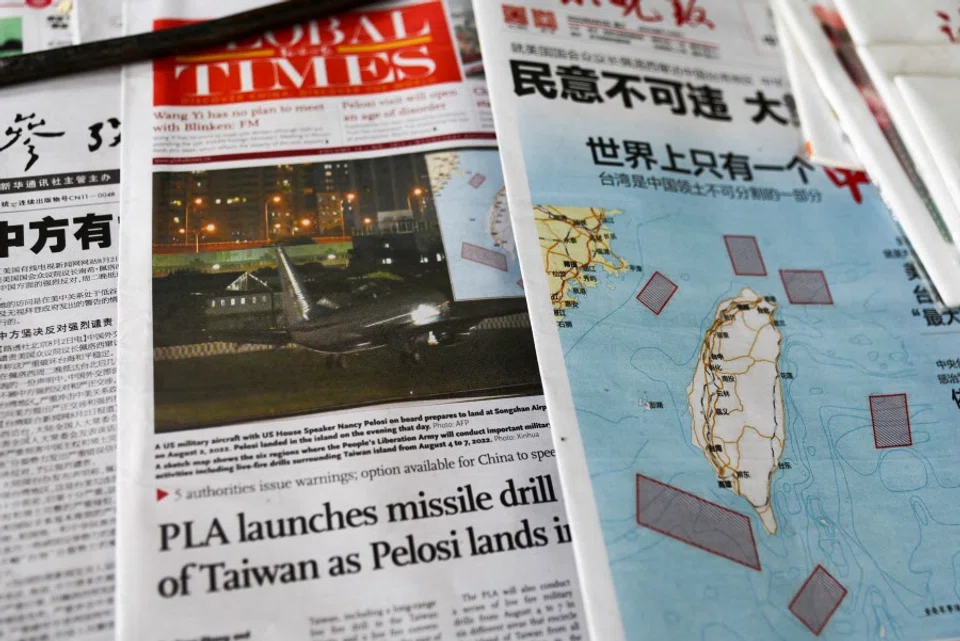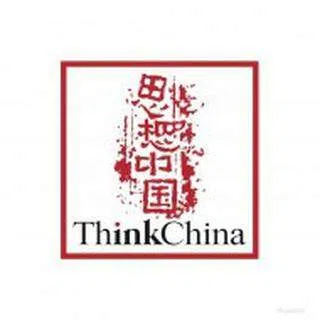Pelosi's Taiwan visit reveals the ugliness of Chinese nationalism
Despite the bluster and big talk of the Chinese government warning against US House Speaker Nancy Pelosi visiting Taiwan, the visit did happen, leading to China's "red fans" asking why no "real" action was taken. It did not help that well-known nationalist figures like former Global Times editor-in-chief Hu Xijin lent their voices to fanning the flames of nationalism, ultimately leading to disappointment and anger.

On the night of 2 August, the plane carrying US House Speaker Nancy Pelosi landed safely at Songshan Airport in Taiwan, sending China's patriotic "little pink and red fans" (小粉红) into a frenzy. They did not see China's military aircraft escort it, intercept it or shoot it down. Actually, besides lip service, China did little. This was far from what the red fans expected; they would have hoped for armed reunification with Taiwan the very next day, with plans to apply to become civil servants in Taiwan. So, who was responsible for these red fans' crash landing back to earth?
It seems that former Global Times editor-in-chief Hu Xijin should bear the main responsibility for stoking the fire in the first place. He was the online "loudmouth commander" who bayed for Pelosi's blood - all the big talk about China's military planes escorting and intercepting and shooting down her plane was Hu's doing. Such senseless and bloodthirsty talk stirred up the patriotism of China's red fans.
It was senseless because China's military planes would never escort, intercept or shoot down Pelosi's plane. No normal-thinking person would order the military to openly kill a US leader and spark off a war between two nuclear powers. It was a cold-blooded thought because only extreme terrorists would create a disaster in the air.
China's red fans have been fed with senseless and cold-blooded ideology for a long time, and were naturally stirred up by Hu's ridiculous patriotic messaging.
Fuelled by senselessness and cold-bloodedness
Talking about senselessness, China's patriotism has always deviated from the civilised world. In the past, the Boxers indiscriminately killed Westerners; the Red Guards burned the British mission in China during the Cultural Revolution; following reform and opening up, at the height of anti-Japanese sentiment in China, Japanese cars were damaged and Chinese who drove Japanese cars were beaten up.
Bloodthirsty slogans advocating the liberation of Taiwan even if it is reduced to wasteland (宁可台湾不长草,也要解放台湾岛), or killing all Japanese even if China is littered with graves (哪怕华夏处处坟,也要杀光日本人), are considered politically correct.

In recent years, red fans have opposed Christmas and Valentine's Day, smearing them as "Western pagan festivals". Of course, they do not oppose Women's Day on 8 March, or Labour Day on 1 May, because they are seen as days of revolution. Red fans would not think about whether to oppose the Gregorian calendar, because there are no instructions from the authorities.
And Chinese patriotism is cold-blooded because it is inhumane and there is no element of humanitarianism or humanism in it. The Chinese authorities see humanitarianism and humanism as bourgeois ideology. Chinese children are not taught love, but struggle and competition, so that Chinese people think that the ends justify the means, whatever it takes.
This would mean, for instance, that it was not wrong that former Chinese President Liu Shaoqi was cruelly persecuted to death. Conversely, Liu and his wife also have a bloody history of persecuting many Chinese to a tragic end. There is no word on whether Liu reflected on the reason for his own tragedy. In China today, no matter how people demonise the US and Americans, it is a show of patriotism. Bloodthirsty slogans advocating the liberation of Taiwan even if it is reduced to wasteland (宁可台湾不长草,也要解放台湾岛), or killing all Japanese even if China is littered with graves (哪怕华夏处处坟,也要杀光日本人), are considered politically correct.
... patriotism is the only mental opium with which the Chinese Communist Party (CCP) can numb the ideology of the Chinese people.
The red fans who grew up on "wolf milk" would naturally be stirred up by Hu, whose crazy talk fits the narrative of the Chinese authorities. China's state media has created the propaganda of "Amazing China" (厉害了,我的国), so that red fans confidently think that the US is on the decline and China is growing strong; and how could a China that is growing strong tolerate Pelosi visiting Taiwan? It seems that Hu is playing the role of Central Military Commission spokesperson, giving instructions for military planes to escort, intercept and shoot down Pelosi's plane. How could the Chinese people - who have lost the ability of independent thought - not buy into it?
Amid China's strict control of public opinion, if the average Chinese expresses any discontent with the government, they are shut down and find themselves in trouble, even jailed. Hu's crazy anti-US talk has never been shut down or blocked by the government. He said smugly: "I am vocal within China, and also one of the representative voices for Chinese media on foreign websites." There is no question that the Chinese government quietly allows Hu's behaviour. For years, Hu has been a banner of Chinese nationalism, and foreign media would pay attention to what he says. Hu's official background allows him to say what the Chinese government cannot conveniently say, and it is a matter of course that China's red fans would see Hu as their "loudmouth commander".

Chinese academic Zi Zhongyun has a line that is blocked on China's internet: "It's been 100 years and there's no improvement - at the top it's still Cixi, and at the bottom the Boxers. That is the saddest thing about China." This captures China's current nationalism. The 18th century British writer Samuel Johnson also said: "Patriotism is the last refuge of the scoundrel."
Following the collapse of communism, patriotism is the only mental opium with which the Chinese Communist Party (CCP) can numb the ideology of the Chinese people. With this weapon, the CCP can continue to hold power and keep the Chinese people from having free elections. But China's ugly nationalism has destroyed overnight the international image that China took decades to build, while unthinking red fans actually believe Hu's crazy talk. But they were extremely disappointed, and vented their feelings by slamming the government.
The Chinese who have some brains would be able to see that the CCP played a losing game both before and after Pelosi's visit...
Extreme nationalism a double-edged sword
Let me give a few examples. Former chair of the Sichuan Online Writers Association Zhou Xiaoping previously participated in the CCP's arts and culture forum, and met CCP leader Xi Jinping. On 30 July, he wrote on Weibo: "Pelosi won't dare to visit Taiwan. I'll live stream eating oats upside down. We have many ways of preventing it, no need for military aircraft to escort. The easiest way is for example if we announced live firing exercises in the relevant waters or airspace, would she still dare to go, at the risk of bombs and bullets?" And on 5 August, Zhou said on Weibo: "Tonight I will eat oats upside down." But in the end, netizens did not see Zhou deliver on his promise, but saw him live stream sales instead. And journalists found that soon after the live stream, the controversial clip had disappeared.

Chinese entrepreneur Chen Guangbiao was top of China Philanthropy Times' 2008 list of Chinese entrepreneurs and called China's top philanthropist by state media. Chen was previously a member of the Chinese People's Political Consultative Conference (CPPCC) for Jiangsu, a representative of the National People's Congress for Nanjing, and a standing committee member of the All-China Federation of Industry and Commerce (ACFIC). In January 2014, Chen held a press conference in New York to hype up buying over the New York Times; in June that year, he gave out money to the homeless there. Before Pelosi's visit to Taiwan, he posted: "If she goes to Taiwan, I will donate 90% of my assets towards national defence." After Pelosi visited Taiwan, he quickly deleted the post and did not say any more, reminding people of why he was always thought of as a hustler.
The CCP is in fact building up the US's case for containing China.
Extreme nationalism is a double-edged sword. Following the height of CCP-induced sentiment against Pelosi visiting Taiwan came its credibility hitting rock-bottom. Soon after Pelosi's plane landed, Weibo user @shanshanmeiyoulaichi2hao said: "Such an embarrassment! ... If you can't do it, don't talk so big... such a mockery for a big country!" Of course, this might be the complaint of a minority group. There are other voices that say the Chinese government's response to Pelosi's visit was far-sighted, such as a piece titled "Many Do Not See China's Cleverness in Pelosi's Visit to Taiwan" (佩洛西窜访台湾很多人没看懂中国的高明).
The Chinese who have some brains would be able to see that the CCP played a losing game both before and after Pelosi's visit, and the military exercises around Taiwan were an even bigger failure. Now people are wondering how China's missiles could hit Japanese waters. If it was unintentional, are China's missiles inferior to Russia's? Looking at the war in Ukraine, if China cannot match Russia, how would the CCP achieve armed reunification with Taiwan? If it was intentional, the CCP would become the biggest motivation for Japan to change its constitution and re-arm itself.
The CCP's threat against Taiwan has drawn criticism from Western countries, while China holding the world hostage with its military exercises has added fuel to fire for the global economy. The CCP is in fact building up the US's case for containing China. And given that the CCP's unwise moves have not prompted the Chinese people to say anything different, is the CCP destroying its legacy step by step?
Related: Class struggle and extreme nationalism have become CCP's ideological weapons | Has China's propaganda on the Taiwan situation failed its public? | Nationalist sentiment exploding in China over Pelosi's visit | Taiwan likely to become biggest loser with Pelosi's visit | Taiwan: A runway for great powers to flex their muscles?



![[Photos] Fact versus fiction: The portrayal of WWII anti-Japanese martyrs in Taiwan](https://cassette.sphdigital.com.sg/image/thinkchina/3494f8bd481870f7c65b881fd21a3fd733f573f23232376e39c532a2c7593cbc)

